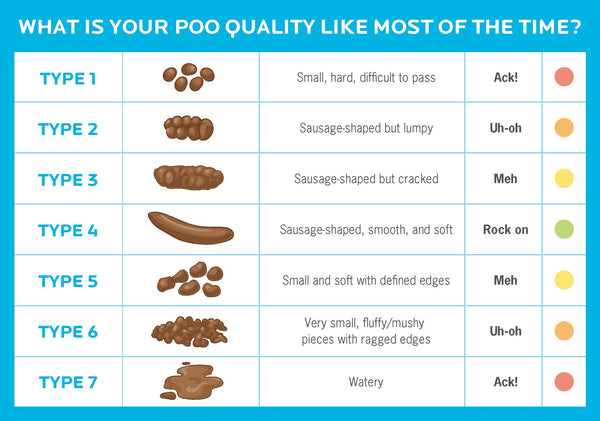Here's How to Tell If Your Poop is Normal
By Julie Andrews
We’re all friends here. So, grab a cup of tea, get comfy and let's talk crap. When it comes to how many trips to the ladies' room we’re taking a day, we’ve all wondered “am I normal?” (we’ve asked ourselves that for other reasons too, but we’ll save that for a different blog post). It’s true that our poop says a lot about us, as does the number of times we go.
With the help of two medical experts, we got to the bottom of what healthy pooping looks like—literally—and how to tell if your poop patterns are normal.
So, how many times a day should you go?
“While there’s no magic number, healthy adults should be going at least once a day to once every other day,” says Daniel Motola, MD, PhD, a gastroenterologist at Gotham Medical Associates and clinical assistant professor of medicine at NYU Langone Medical Center. And when you do go, you want to feel like you got everything out, having a so-called “complete evacuation,“ without any need to strain or manually remove stool, adds Dr. Motola.
While there’s no magic number, healthy adults should be going at least once a day to once every other day
Generally, you’ll feel the need to go after you have a meal, due to the gastrocolic reflex, says Dr. Motola. When you eat, this stimulates movement in the gastrointestinal tract and this reflex stimulates contractions in the large intestine which lead to a bowel movement. “Typically, a bowel movement occurs within fives hours of having a meal and before the next meal,” says Dr. Motola, “though there is quite a bit of variance among people, and some have exaggerated refluxes that can send them to the bathroom in the middle of dinner.” Caffeine can be another poop trigger, says Dr. Motola, and downing a cup of joe can coincide with having a movement.
There’s absolutely no need to put pressure on yourself and set pooping milestones throughout the day. But you do want to tune into your own body and individual patterns, says Dr. Motola. So, if, for example, you’re giving a big presentation after lunch, having a hot date after work or going on a long hike away from clean bathrooms and typically take a dump after a meal, you may have a slightly smaller meal before the big event and plan your meal time accordingly.
What makes up a perfect poop?
Healthy bowels movements are typically defined as being spontaneously occurring and occurring with minimal effort (in other words, no grunting or pushing) along with what Dr. Motola calls “complete evacuation” (you get the picture). Factors affecting quality of poop include fluid intake, fiber intake and activity levels, says Deborah Malkoff-Cohen, MS, an NYC-based registered dietitian. “While amount of stool matters, the consistency of the bowel movement is the main factor to note,” adds Malkoff-Cohen, “As long as it’s smooth and in an “S” shape and you’re not straining, you should be okay. None of those little pebble poops!

If you find yourself wondering where those poops are, you may not be drinking enough water, eating enough fiber or could possibly have an underactive thyroid (known as hypothyroid). “You want to make sure you’re getting enough soluble and insoluble fiber, by eating fruits, vegetables and whole grains,” says Malkoff-Cohen. When you don’t get enough fiber in your diet, this can “keep digested foods at a standstill in your intestines, she says. “And drinking enough water is very important, because eating enough fiber without drinking enough water and fluids will create a traffic jam in your GI tract,” she adds.
Now, if you find yourself running to the loo all day long, this could mean you are taking in “too much fiber and/or too many sugar alcohols from sugar-free foods (these end in “ol” on ingredient labels, such as sorbitol and xylitol),” says Malkoff-Cohen. “These do not get digested and hang around until they reach the large intestine and wreak havoc, causing bloating, gas and diarrhea.” Also, too much coffee or tea can have a similar effect, as the caffeine can stimulate the bowels to contract, she explains. Other culprits could include a case of the flu or a stomach bug of conditions such as Crohn’s disease, gastroenteritis, celiac, for examples, says Malkoff-Cohen.
There are no hard and fast rule when it comes to how long a poop should take, says Dr. Motola, but what’s key is that your movement is effortless and spontaneous. “Of course, a little pushing is sometimes needed, but, basically, you want to take your time, not force it, and let your body do its job. Ideally, movements shouldn’t take more than a few moments from the time of urgency or sensation of needing to go to the time you’re finished.”
When to Take Action
If you notice a change in your typical bowel habits, see blood in your stool or suddenly have trouble with movement despite laxatives, weight loss and abdominal pain, consider consulting your doctor. If you find yourself hanging by the throne more than five minutes a poop session, this may also be cause for you to check in with your doctor.





